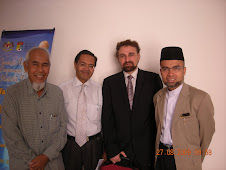Managing the Shariah Advisory Process
Download Brochure COURSE BACKGROUND
New Islamic financial product structures need to be legally as well as Shariah compliant - one without the other is unacceptable. The Shariah advisory process is therefore a hugely important part of Islamic banking and finance and the product development process.
Managing Shariah advisory and the parties involved is no easy task. It has been suggested that financial institutions spend too little time preparing themselves for this process, and instead concentrate on traditional legal work. Institutions sometimes do not fully appreciate the work of Shariah advisors and how they legitimize new products and monitor existing ones. There is also limited understanding of how scholars have to be able to read, understand and sometimes challenge draft contracts produced by an institution's advisors.
Conversely, matching the objectives and expectations of financial institutions and their advisors can be highly challenging. Financial institutions have to adhere to strict product development timetables and ultimately have to make money. Delays are expensive. Better management and understanding of the Shariah advisory process, as well as the increased availability of information related to it would ensure such delays and problems are kept to a minimum.
Islamic Finance Training, in association with leading Shariah advisory Dar Al Istithmar, have developed this unique 3 day training program to enable you and your institution to better manage Shariah advisory. The course will be delivered by three leading advisors and will offer practical solutions to common problems.
[Back to Top]
Who Should Attend
Islamic bankers
Product development personnel within banks and other financial institutions
Fund managers
Auditors
Legal counsel
Risk managers
Compliance officers
[Back to Top]
COURSE AGENDA
Day 1
Session 1: Shariah advisement, its nature, need and scope in Islamic banking and finance
Different models of Shariah advisement
Embedded Shariah Boards / Shariah Supervisory Committees
External Shariah scholars-In-house Shariah advisors
Independent Shariah advisory firms
The role of Shariah standards
Fatwas issued by independent bodies like the OIC Fiqh Academy , Kuwait Fiqh Academy etc.
Shariah standards issued by Accounting and Auditing Organisation for Islamic Financial Institutions (AAOIFI)
Why do we need Shariah advisement?
What is covered by Shariah advisory services?
Revising the structure, legal documentation and evidence that providers of Islamic financial services / products intend to implement Shariah recommendations
Session 2: Shariah and Fiqh
Shariah, Fiqh and Shariah advisement
What are the differences between Shariah and Fiqh?
Session 3: Shariah focus - AAOIFI standards
Reading through a selected AAOIFI standard to highlight how important it is to have done your own research before approaching a Shariah scholar/Shariah Supervisory Committee
AAOIFI Shariah Standard No. 10 on Salam and Parallel Salam
Session 4: Regulatory issues
Regulation of Shariah advisement
The Malaysian model
The Pakistani model
AAOIFI's Standard on Governance of Shariah Advisement (forthcoming)
Session 5: Product Development Financial
In this session we shall start working on developing a new product with an objective to obtain Shariah-compliance on the product by the end of this training program
Day 2
Session 6: Shariah advice and law of the land
Conflicts between Shariah and law of the land
Harmonising Shariah with law of the land
Session 7: Hedge funds
Seeking advice on hedge funds/alternative investment vehicles
Session 8: Seeking Shariah advice - a case study
Identifying what you want to achieve from a given structure
Conveying to scholars what you want to do
Sharing with them what is done conventionally to achieve what you want to do
Seeking clearance on the methodology underlying your structure
Issuance of Fatwa
Session 9: What is Fatwa?
A sample of different Fatwas to be discussed with an objective to inform the participants what they should be seeking in the form of Fatwa from Shariah scholars/advisory firm
Session 10: Further Product Developmet
Further discussion on the product to be developed in compliance with Shariah (from Session 5)
Day 3
Session 11: Issues in Shariah monitoring
Shariah monitoring: its need, nature and scope
Shariah monitoring is about information sharing between Shariah scholars/advisors and the institutions offering Islamic financial services
Shariah rating
Session 12: A focus on Shariah scholars
Focused on some of the busiest Shariah scholars, their specialisms and their perception in the market
Session 13: Case Study
Seeking Shariah advice on Islamic structured products
Session 14: Discussion Board
This session will provide an opportunity to the participants to discuss any matters arising from the training program with the trainers
Session 15: Further Product Developmet
Final session on developing a Shariah-compliant product (from Sessions 5 and 10)
Course Conclusion & Review
[Back to Top]
EXPERT COURSE DIRECTOR
Dr Humayon Dar - Managing Director
Dr Humayon Dar is a world-known Islamic economist with excellent academic credentials (BSc Hons. Islamic Economics and MSc Islamic Economics from International Islamic University Islamabad where he benefited from scholarship of some top Islamic jurists and Muslim thinkers; MPhil Economics and PhD Economics from Cambridge University where he conducted research on Islamic finance). His post-doctoral research has exclusively been on Islamic economics, banking and finance.
As Secretary of DI's Shariah Supervisory Committee, he is responsible for Shariah coordination in addition to his managerial role within the company. As a member of Editorial Boards of International Journal of Islamic Financial Services and Review of Islamic Economics, he is involved in setting new directions in the field of Islamic economics, banking and finance.
A number of governmental and private organizations have benefited from Dr. Dar's advise on the Islamisation of banking and finance and training of senior management of Islamic banks. He has been a visiting/adjunct trainer for Institute of Bankers (a think-tank associated with the State Bank of Pakistan , the central bank), Bank Indonesia and numerous other banking and financial institutions.
Dr Salman Khan - Senior Product Manager
Dr Salman Khan comes to DI from an experienced consultancy background, having worked extensively as an economics consultant to a range of governmental departments in various countries, in a number of fields. In addition, his impeccable academic credentials include a doctorate in Economics from Oxford University , MPhil from Cambridge University , and BSc in Economics from University College London. Dr. Khan has maintained a keen interest in Islamic economics and finance for many years prior to joining DI, strengthened by a one-year research associateship in Islamic Economics at the Oxford Centre of Islamic Studies.
Dr Khan works on devising innovative solutions for clients offering Islamic financial products, to ensure that their products are Shariah-compliant. His work benefits greatly from a strong quantitative background in econometrics and statistics and the use of statistical packages.
Dr Adnan Aziz - Product Manager
Dr Adnan Aziz holds a PhD from Loughborough University in UK. He has had formal training in the field of Islamic economics, banking and finance from International Islamic University in Pakistan , where he earned his BSc Hons and MSc in Economics.
Dr Aziz brought with him a wealth of academic and research experience from Pakistan , UAE and UK , before joining DI as a Research Analyst.
Based in our London office, Dr Aziz is responsible for developing cutting-edge Shariah solutions for the institutions offering Islamic financial products and looks after the in-house product development team. With excellent quantitative skills and experience of using econometric tools for data analysis, he also manages DI Global Islamic Finance Reports.
Tuesday, September 16, 2008
Subscribe to:
Post Comments (Atom)







































No comments:
Post a Comment